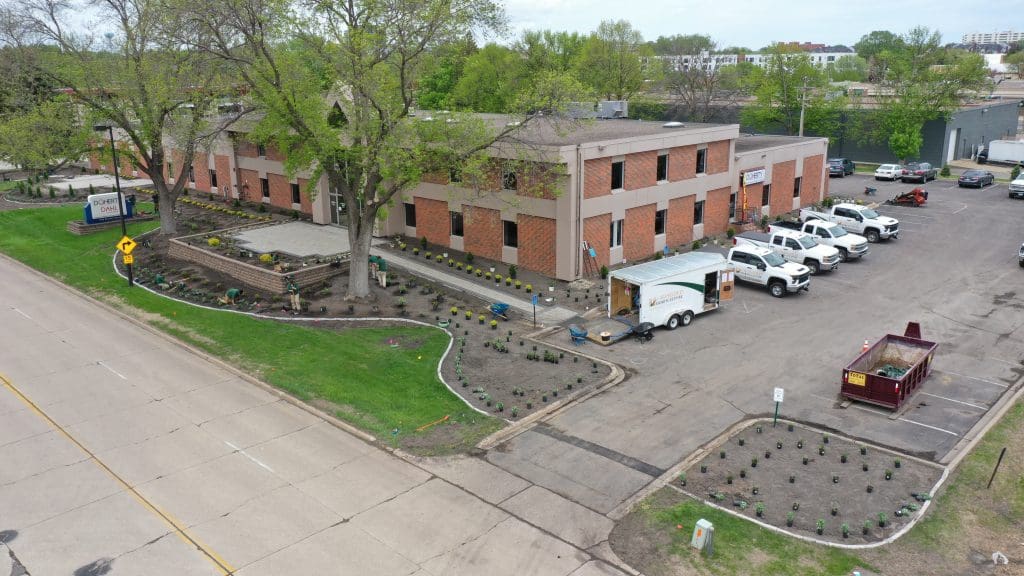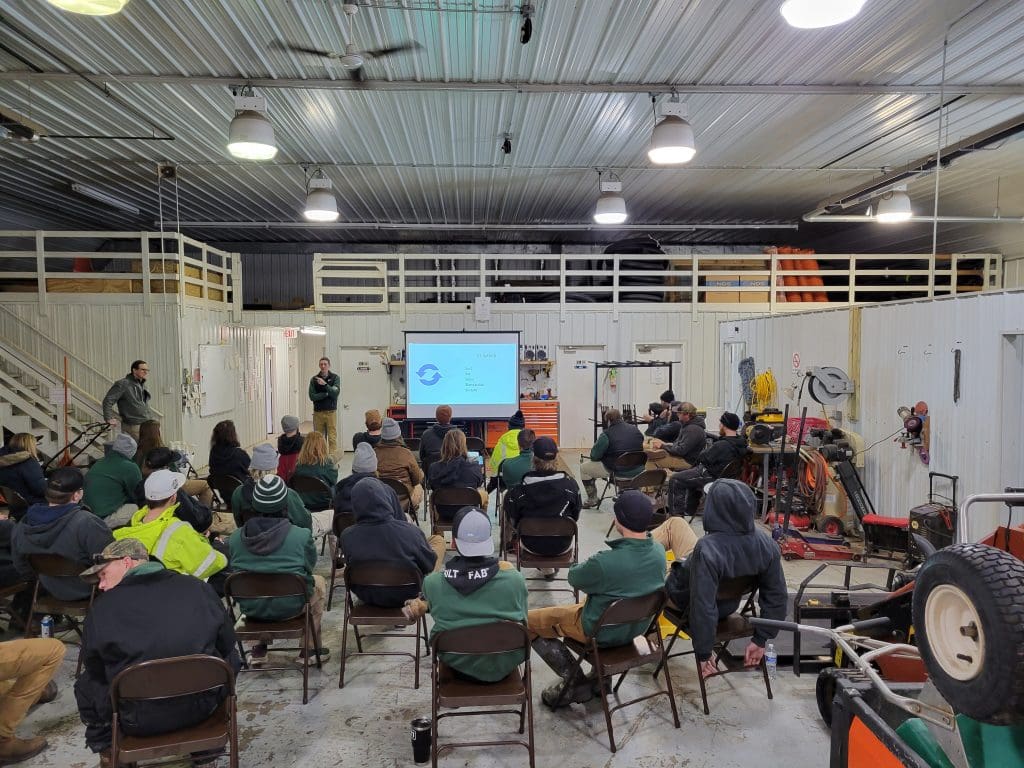
Our Level Up series shares the strategies that help landscape and lawn care companies get to the next level.
From day one, Mangold Horticulture, based in Excelsior, Minnesota, has been a full-service garden-centric company for high-end residential clients on the west side of Minneapolis.
“We try to sell ourselves as the full solution,” says Justin Mangold, president of Mangold Horticulture. “We have a lot of clients that classically are in the situation of they had Tim mowing their lawn and Suzy doing the flowers and another guy doing the irrigation. That works great until one of those cogs disappears and then the whole thing is out of balance.”

Like others in the industry, Mangold grew up mowing lawns and then went on to study horticulture at the University of Minnesota. He worked for another landscape company for a number of years before he had his now or never moment and decided to go into business himself in 2015.
Since starting his company, Mangold Horticulture now has an annual revenue just over $6 million. He says they’ve been growing fairly aggressively over the last few years, seizing the market and creating opportunities for his team.
“We’re just trying to right size and balance so that we’re not stretching ourselves too much,” Mangold says. “We’re certainly seeing it as a good market to be in and that there’s opportunities for us to continue to be a larger company in this market.”
Keys to Success
Mangold says the biggest key to his success is focus on his team. He wants to hire people who want to be there versus people who applied just because they saw the ‘help wanted’ sign. Mangold says while it’s dirty work and it can be hot or cold outside, he’d rather be landscaping than doing anything else.
“I passionately believe that this is what I want to be doing and that I love what I do,” Mangold says. “So, I tell my team that if they don’t love what they’re doing, I’ll help them find another job.”

By having a team that loves their work like Mangold, clients pick up on their passion and this rolls into more opportunities.
“What we’re trying to do is create a niche in the market for being a solid answer to our high-end clients’ needs and we’re trying to build a team that really can fulfill that by being excited about what they do,” Mangold says. “That model, as simple as it is, has been our success over the last couple of years to really roll together and grow.”
Mangold says that they are also a strategy-based company where they lay out what they want to achieve for the year and grow into it. While the company doesn’t practice open-book management, they do go over how each division is performing monthly and how the company is doing as a whole.

“I don’t know that we have any silver bullet,” Mangold says. “We’re just trying to really make sure that the team likes what they’re doing, and then has a plan that everybody knows. We make those plans known. It’s supposed to be for the whole team to know how we’re doing, where we’re going, and measuring those types of things.”
Mangold also joined NALP in the past few years. He says the Field Trip to R.P. Marzilli’s headquarters was the first NALP event he had attended.
“It was really good to get out of your own comfort box and see how somebody else does it on the other side of the country,” Mangold says. “It was a great opportunity through NALP to actually get to see something like that and be the bridge for us to get out there. It’s not like I would have gotten out there on my own and just knocked on their door and said, ‘Hey, can I take a look around?’”
Recruiting Passionate People
One notable aspect of Mangold Horticulture is that none of their 40 staff members are seasonal employees.
“Our entire staff is year-round here in Minnesota, which is a big deal,” Mangold says. “All 40 of my staff are on in some capacity year-round. They certainly have reduced hours in the winter, but we’re making sure that this isn’t a seasonal layoff. They’re working 30 to 35 hours in the winter and 50+ in the summer.”

While during the peak season their crews spend 20 to 30 hours a week maintaining residential properties, it takes a fraction of that time to snowplow these residential drives. Mangold supplements this with commercial snow work to keep his crews busy over the winter.
Aside from providing year-round work, Mangold says his current employees help bring in new team members, who are rewarded with referral bonuses.
“Our gardeners are here because they enjoy the type of gardening we’re doing and then that attracts more like-minded individuals,” Mangold says.
Mangold says their market presence is also big and they work to make sure their branding attracts their ideal employee. He says they are methodical about how they brand their team and uniform. Their trucks and trailers are all labeled the same, so it’s clear who is on the site. When people see them maintaining certain properties, it sometimes drives them to the company website, where they find the careers page.
“If you just put up an opportunity for hire page and think it’s going to be a direct source, it’s not going to,” Mangold says. “You have to work your brand to get you where you want to be.”
He says they do tend to attract more skilled labor because of who they’re looking for.
“Even in our mowing crews, we are trying to find people that care about the details and that are looking to make the property look its best,” Mangold says. “We’re measuring our team on quality, not budget performance.”
Recent Growth
Over the past four years, Mangold Horticulture has experienced steady but heavy growth of over 20 percent each year.
“At 20 to 30 percent growth a year, we’ve really scaled to the point where it’s not sustainable to keep that type of percentage but yet at the same time, we’re continuing to take on more work and grow as a company, but hopefully a little bit more balanced in the percentages and size of what that means for us,” Mangold says.

Mangold says the biggest challenge with growing is knowing where they’re at, understanding their footing and when to phase in different changes to get where they need to be next. As the company has grown, they’ve moved to bring more of the services they offer in-house.
“We certainly do still sub some stuff, but we’re trying to make sure that we’re controlling as much of the environment as possible so that we can control our own timelines and our own destiny,” Mangold says.
He says maintaining their culture while scaling up has also been a challenge.
“Maintaining culture while growing is a dangerous balance of making sure that you are actually in front of your team and your message is being heard,” Mangold says. “It’s really just a matter of continually striving to make sure that you’re putting out what you want from your team and where to go with it. We’re big believers in what makes this company different than any other is you, so act like it.”
One practice Mangold has had trouble scaling is going out in the field and pitching in himself when help is needed. He says this was more common when they had 25 employees instead of 40, but he still tries to visit from time to time.
“I certainly am the owner that knows how to do every job in the company and I want to make sure that my team feels that,” Mangold says.
Click here to read more Level Up stories.

